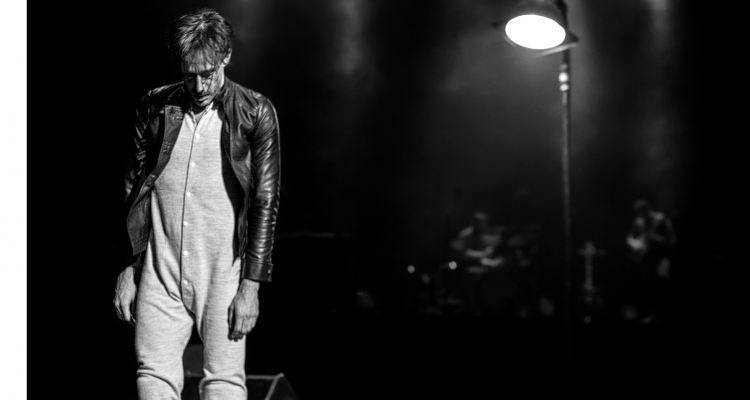Frédérick Gravel, the Canadian choreographer, dancer, musician and lighting designer, performed his latest show, “Fear and Greed,” at the Regina A. Quick Center on Saturday, Nov. 17, the final performance of a three-night showing at the Quick Center. “Fear and Greed” is part rock-concert, part monologue and part dance. It tells the story of a man who battles the twin forces within himself: the need to create artwork and the fear that art will never be enough to balance out his innate greed, which could lead to his destruction.
When I went for the Saturday show, the entire stage was packed, as all the audience members were seated in bleachers on the stage.
At the start of the show, Frédérick Gravel was perched on a brown crate in the center of the stage, a can of Miller Lite beer on the floor to his right, a brown guitar to his left. Dressed in a black leather jacket with fringes on the edges and a full gray pajama set, he resembled a rock star in repose. As he stepped off of the brown crate and lay on the floor, he reached out one hand towards the silver beer can. He turned away from it and grabbed his guitar and began to play a folk song which epitomized the artist’s struggle between creation and self-destruction.
Gravel moved slowly, his shadow rising on the curtain behind him, his precise dance movements delineating the human need to search for direction. Powerfully, almost aggressively, guitar and drums began to blast from the speakers. For moments I wondered if the music was live and the band was just hidden somewhere backstage or if the music was a high-quality recording. Exploring these liminal spaces between reality and imagination, the uncertainty of everyday existence, is where this production shone.
One of my favorite moments in the show was when Gravel pulled back the curtains of the Quick to reveal the full rock band (Nicolas Basque and Jean-Luc Huet on bass guitar and guitar and José Major on drums) and Gravel began to sing original music by Basque, Philippe Brault, Gravel and Major.
The psychedelic red, green, blue, purple and pink stage lights shone above the stage as Gravel swayed back and forth, his character in a search for direction, in a search for his true self.
At the end of the second-to-last song, Gravel sprayed the beer can above his head and began to dance on top of the fallen beer, depicting the modern bacchanalia: the greed of modernity, for more money, for seduction, for more life, for more everything. Gravel’s dance showed how some fear is necessary, but excess fear and greed leads to destruction.
Gravel then picked up his guitar, his character returning to creation, away from destruction.
“The stars don’t care, but I do. The gods don’t care, but I do,” Gravel sang.
As Gravel pushed and pulled against his own reflection, ebbing waves of a tide at sea, he sang, “Sing to me a lullaby, about something else but fear and greed,” reminiscent of a time of simplicity.
I liked how the narrative was structured so that audience members could create the story in their own minds. There were limitless possibilities and understandings, as Gravel’s work breaks the boundaries that fear and greed place on people by creating a unifying experience that caused viewers to reflect on their own lives and carry this sense of freedom and unity into their own lives and relationships.
Sophomore Erica Lynch said that she liked the performance. “I thought it was expressive and empowering and an interesting commentary on how fear can be inspiring,” she remarked.
As Frédérick Gravel himself said in a 2019 interview with Diane Jean, “I willingly put myself through a journey…not of control, but of abandon. That’s what interests me.”
“That’s what frightens me.”


Leave a Reply